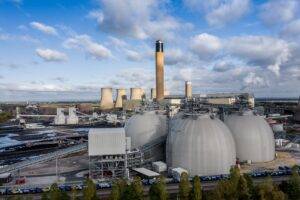
The prime minister will emphasise the need to strengthen Britain’s energy security when he meets industry leaders this week.
Rishi Sunak is to set out details of the government’s plans for the UK’s fossil fuel and green industries.
The Sunday Times says he will announce multimillion-pound funding for a carbon capture project in Scotland.
The Tories are facing internal divisions over their green policies, with some MPs calling for a rethink.
Environmental groups have expressed “deep alarm” at reports the government may water down its green commitments.
Anger over London Mayor Sadiq Khan’s plans to extend the capital’s ultra-low emission zone (Ulez) was widely seen as helping Conservatives seal a narrow victory in the Uxbridge by-election.
Both Mr Sunak and Labour leader Sir Keir Starmer have urged Mr Khan to reflect on the Ulez rollout as people struggle with cost-of-living pressures.
Mr Sunak is now setting out his position as being on the side of drivers.
In an interview with the Sunday Telegraph, he said he has ordered a review of low traffic neighbourhoods (LTNs) because he supports people to “use their cars to do all the things that matter to them”.
With intense heatwaves worldwide this month prompting climate change warnings, the backlash against Ulez has propelled the UK’s net zero target to the top of the political agenda.
The PM and his Energy Security Secretary, Grant Shapps, will meet senior representatives from the oil and gas, renewable and nuclear industries over the week.
The government said it hoped the meetings would ensure the UK was making the most of opportunities to boost its energy infrastructure and help it to press ahead with safeguarding energy security and reducing reliance on “hostile states”.
According to the Sunday Times, Mr Sunak will start the week in Aberdeenshire where he will announce funding for the Acorn carbon capture project, a joint venture between Shell UK and other companies.
The project would see harmful greenhouse gas emissions piped under the North Sea.
This would prevent carbon dioxide being released into the atmosphere, by capturing it at the point where the fossil fuel is being burnt.
The technology is seen by policy makers as a vital tool in reaching net-zero emissions by the middle of the century and could create up to 21,000 jobs, the Sunday Times reported.
Some environmentalists, however, are against it because they consider it a distraction from the urgent need to cut emissions.
The Acorn Project has been under development in various forms for more than a decade.
It had hoped to be one of the first projects of its kind to receive government backing in 2021, but lost out to two projects in the north of England around the Humber and the Mersey.
If given the go ahead this week, it would become Scotland’s first carbon capture and storage facility.
Mr Sunak will vow to “put powering up Britain from Britain first”, making the most of the UK’s resources, reducing reliance on imported fossil fuels and investing in renewables technologies.
The government, despite alarm from climate campaigners, is also committed to new oil and gas licences in the North Sea.
‘Failed energy policy’
In its energy security strategy, published in March, the government said it was committed to further oil and gas exploration to “minimise our reliance on overseas imports”.
Calling energy security “national security”, Mr Shapps said: “Since Putin’s illegal invasion of Ukraine the government has driven Putin from our energy market, paid around half of a typical family’s energy bill and grown our economy by driving forward major energy projects.
“This week we will go even further. Forging ahead with critical measures to power up Britain from Britain, including supporting our invaluable oil and gas industry, making the most of our home-grown energy sources and backing British innovation in renewables.”
Shadow climate secretary Ed Miliband said families and businesses were paying the price, in higher energy bills, of “13 years of failed Tory energy policy”.
“Labour will take no lessons from the party that banned onshore wind, crashed the market for solar, stalled energy efficiency, haven’t got any new nuclear plants started, and left us at the mercy of tyrants across the world.”
Jamie Peters, climate coordinator at Friends of the Earth, said ending the UK’s “reliance” on fossil fuels was the “only sensible and effective way” of increasing energy security.
“The UK is blessed with huge renewable energy resources, offshore and onshore, and we should be making better use of these for long-term security and economic prosperity.”
Read more:
Rishi Sunak to meet leaders over energy security plans





